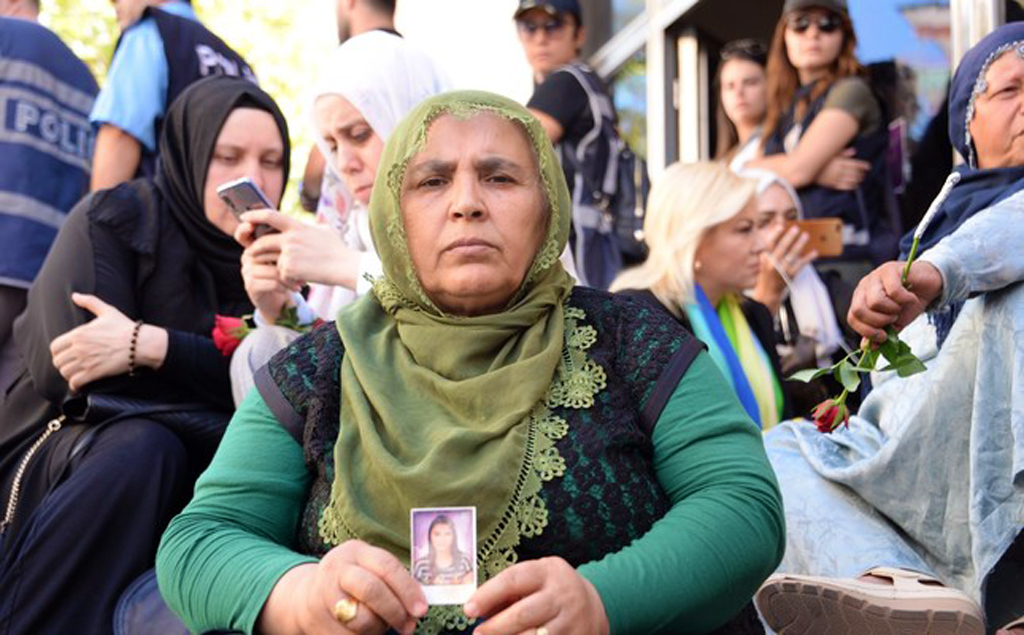Turkey's Syria policy and the US response
The Syrian crisis is not something that can be handled solely through Turkish efforts; the region's biggest problem needs to be confronted by both external and internal stakeholders
More


To stop PKK terrorism, acknowledge the plight of Kurdish parents
The Kurdish mothers' protest in Diyarbakır teaches valuable lessons to the opposition, which is busy playing the three monkeys and seeing no evil
More
Kurdish mothers, who have been staging a sit-in protest that is above all political ideologies and stances, demand their sons back from the PKK no matter what
For the last two weeks, the news of a group of Kurdish mothers protesting the abduction of their children by the PKK has dominated the headlines in Turkey. It all started a few weeks ago when Hacire Akar launched a sit-in protest in front of the pro-PKK Peoples' Democratic Party (HDP) headquarters in Diyarbakır, over the abduction of her youngest son.
Hacire Akar, a mother from Diyarbakır, is the symbol of a new protest movement against the PKK terrorist organization and the Peoples' Democratic Party (HDP) in Turkey. Her 22-year-old son Mehmet was taken to the HDP building in Diyarbakır by some of his "friends." To her dismay, she learned that her son joined the ranks of the PKK.
The second half of September will be a busy season. Turkey, Russia, and Iran will hold a trilateral summit on Sep. 16. Five days later, Turkish President Recep Tayyip Erdoğan will fly to New York for the U.N. General Assembly's opening session.
Idlib crisis getting more complicated
For the last several weeks the Bashar Assad regime forces have relaunched and gradually intensified airstrikes in northwestern Syria's Idlib..
More


International indifference on Idlib complicates Turkey's position
The U.S. and European actors' indifference in Syria and pressure on Turkey weakens Ankara's position vis-a-vis Moscow in the political deal for Syria
More
A new conversation with strategic perspective, realistic goals and achievable outcomes needs to be restarted between Turkey and the U.S.
Considering the military capability of Russia and the U.S. and the game-changing capacity of Turkey, it will take time to reach a real solution in the Syrian crisis
Turkey's opposition parties see the replacement of three elected mayors with independent trustees as "part of the government's political game." They claim that this measure was intended to "drive a wedge between the Nation Alliance's components." In other words, the opposition says that the Turkish government sought to plant seeds of discord between the Republican People's Party (CHP), the Good Party (İP), and the Peoples' Democratic Party (HDP).
The public debate over the dismissal of three mayors rages on in Turkey. Observers concentrate on the various legal and political dimensions of what happened..
The CHP and the Good Party (İP) have a responsibility to help the HDP distance itself from terrorism – as opposed to blaming the government and encouraging the HDP to stick to its guns
Turkey and the United States are setting up a joint operations center at Şanlıurfa in Turkey under a recent agreement. That U.S. European Command (EUCOM), as opposed to U.S. Central Command (CENTCOM), commanders are involved in negotiations reflects both sides' commitment to the deal.
Tensions between Turkey and the United States de-escalated thanks to a recent agreement on the proposed safe zone in Syria. If Washington sticks to the deal, joint steps could follow in Syria and Iraq.
After three days of intense negotiations, Turkey and the U.S. reached an agreement on the proposed safe zone in Syria. Both sides issued written statements to announce the establishment of a joint operations center and reaffirm their commitment to addressing Turkey's security concerns.
Negotiations between Turkish and U.S. military officials regarding a safe zone in Syria ended this week with an agreement. This discussion has been going on at least seven months, following U.S. President Donald Trump's decision to withdraw U.S. troops from Syria.
After weeks of difficult diplomatic consultations and negotiations between diplomats and military officials from both sides, Ankara and Washington managed to reach a breakthrough on the situation in northeastern Syria. Turkish and American officials agreed on three item protocols that satisfy the fundamental concerns of both parties. The agreement includes the following items: "Rapid implementation of initial measures to address Turkey's security concerns," "Starting up a joint operations center in Turkey as soon as possible" and the "Creation of a safe zone and 'peace corridor' for the return of displaced Syrians to their country."
Turkey is hell-bent on neutralizing the terrorist threat next door. Neither the threat of sanctions nor the endlessly reheated Daesh story will convince the Turks to abort this mission
As expected, the National Security Council's most recent statement reiterated Turkey's commitment to combating terrorism. The communiqué made references to Turkish military operations in northern Iraq and the assassination of a Turkish diplomat in Erbil, criticized Interpol over the cancellation of arrest warrants for PKK leaders, urged NATO to act in line with the spirit of alliance and stressed Turkey's commitment to protecting its interests in the Eastern Mediterranean.
When the discussion started between Turkey and the U.S. regarding a 'safe zone', many considered it a possible turning point in relations. The mutual mistrust in Syria and an escalating divergence of opinions between the two countries throughout the Syrian civil war had derailed relations more than any other issue in the last decade.

















